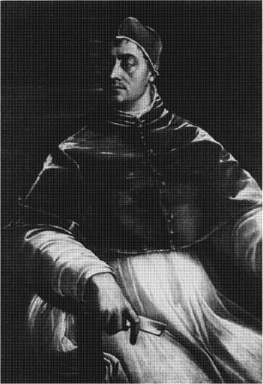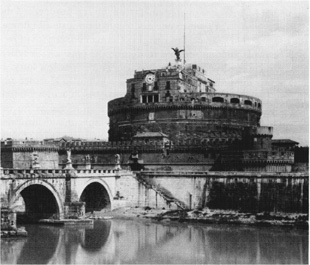A World Lit Only by Fire (36 page)
Read A World Lit Only by Fire Online
Authors: William Manchester

T
HE POPE, AFTER ALL
, was a Catholic, if not a very good one, and because his Church hadn’t changed its view of heresy, one might have expected
him to have met the Protestant revolt with a terrible swift response. The dimensions of the threat were staggering. But Leo
failed to perceive this; he had learned nothing since Worms. To him the great split in his realm was still “a squabble among
monks,” and he assumed that all pious men were governed by Augustine Triumphus’s
Summa de ecclesiastica potestate
(1326), promulgated two centuries earlier by Pope John XXII, which had decreed that as God’s vice-regent on earth, a pontiff
must be obeyed, even when he is a great sinner.
Leo wasn’t a great sinner, but religion ranked rather low in his priorities, below learning, living well, serving as head
of the Medici family, and making war. He was one of history’s great squanderers; according to Francesco Cardinal Armellini
Medici, treasurer of the Holy See, he spent 5 million ducats during his seven years in the Vatican and left debts exceeding
800,000. How much of this went into supporting Charles V’s imperial armies is unknown, but Leo was committed to France’s defeat,
not because of Francis I’s secret sympathies for Protestantism—he had no inkling of that—and not even because, like Pope
Julius, he was pursuing realistic political goals. Despite Charles’s military successes, which would culminate in his great
victory over the French at Bicocca, Leo’s only spoils were two provinces in northern Italy, hardly worth the loss of Germany,
Switzerland, and Scandinavia to Protestantism.
Nevertheless an excuse for a celebration was a temptation Leo could not resist. On the last evening in November 1521 he held
an all-night banquet at the Vatican, complete with fine wines, champagne, gambling, music, theatricals, acrobats, fireworks,
and his many
nipoti
, including three nephews and two cousins, all wearing the cardinals’ hats he had bestowed upon them. As always, he had a
marvelous time, though the price turned out to be extravagant, even by his standards. At dawn, as his guests departed, he
withdrew, explaining that he felt ill. He had caught a chill. By noon he was running a fever, which, by nightfall, had killed
him.
He was forty-six years old. He was also bankrupt. Armellini found there wasn’t enough money in the pontiff’s vaults to provide
candles for Leo’s coffin; he had to use melted-down stubs from the last cardinalate funeral. Had the dead pope been spared,
Roman wags said, he would have sold Rome, then Christ, then himself. He had sponsored magnificent painting and sculpture,
which should have counted for something, but there were few kind words for him that bleak December. Because he had mishandled
the Protestant apostasy, wrote Francesco Vettori, a contemporary historian, Leo had left the papacy in the “lowest possible
repute.” In the streets of Rome men hissed the sacred college on its way to choose his successor.
Their contempt was unjustified. For the first time in nearly a century their eminences chose well. They hadn’t meant to; the
outcome was unexpected, the consequence of a three-way deadlock. In a move to break it, someone nominated Adrian Cardinal
Boeyens of Utrecht, the emperor’s childhood mentor, who wasn’t even present. Rival blocs, trying to outmaneuver one another,
wound up outfoxing their own interests; to their horror, they found they had actually elected the unknown prelate, who thereby
became Adrian VI, the only Dutch pope in history—“the Barbarian,” as Romans immediately began calling him.
*
That is precisely what he was not. A former professor of the University of Louvain, Adrian was exactly what Catholicism desperately
needed: a reformer.
In his first speech to the cardinals he bluntly told them that corruption in the Church was so rife that “those steeped in
sin” could “no longer perceive the stench of their own iniquities.” Under his predecessor, he said, “sacred things have been
misused, the commandments have been transgressed and in everything there has been a turn for the worse.” They eyed him stonily.
He moved decisively to end the sale of indulgences, outlaw simony, cut the papal budget, and assure that only qualified candidates
for the priesthood were ordained, but his orders always miscarried. Unable to bridge the cultural barrier with the Italians
around him—only two of his aides were Dutch—he was thwarted at every turn by the entrenched Curia, and after a year in
office he died, unmourned, having been, wrote Vettori, “a little and despised pope.”

T
HE
I
TALIAN CARDINALS
, grateful for the chance to rectify their mistake so soon, now turned to one of their own: Giulio de’ Medici, a cousin of
Leo X, who became Pope Clement VII (r. 1523-1534). Weak and vacillating, Clement tried to play Charles V and Francis I off
against one another. He entered into secret treaties with each, and was exposed, thereby earning the distrust of both. Italy
became a bleak battleground. Two Englishmen crossing Lombardy wrote home of starving children in Pavia, adding that “the most
goodly countree for corne and vynes that may be seen is so desolate that in all that ways we sawe [not] oon man or woman in
the fylde, nor yet creatour stirring, but in great villages five or six myserable persons.”
It never seems to have occurred to this pope that Rome itself was vulnerable to mayhem—that his fellow Christians might repeat the Visigothic sack of the Eternal City. Yet his alliances
with France offended Romans loyal to the Holy Roman emperor, and as a Medici he had inherited enemies, among them Cardinal
Pompeo Colonna, a feuder, a hater, and an ambitious prelate who had his eye on the papal tiara. Colonna plotted Clement’s
assassination. Rallying imperialists, he led a raid on the Vatican in 1526. Several members of the papal household were killed,
but the pope

Pope Clement VII (1478-1534)
himself escaped through a secret passageway built for this express purpose by the Borgia pope, who had been better at this
sort of thing than he was.
The pontiff and the ferocious cardinal reached terms and the raiders withdrew, whereupon Clement, after granting himself absolution,
hired a band of mercenaries and leveled Colonna’s properties. He felt victorious, and congratulated himself. Yet the sacrilegious
behavior of the raiders should have warned him of worse to come. Donning the Holy Father’s robes while he escaped through
the hidden passage, they had pranced about the piazza of St. Peter’s, mocking the Vicar of Christ. A papal secretary of state
wrote the papal nuncio in England—where the devout King Henry VIII worried about the safety of His Holiness—“We are on
the brink of ruin.”
The seeds of ruin lay in the ill-disciplined, famished, unpaid troops of Charles V, who had outfought King Francis’s army,
crossed the Alps, and were at large in northern Italy. Led by the Constable de Bourbon, a French renegade, their spearhead
was formed of
Landsknechte
(mercenaries) from central Europe, and the defenders heard a cry which one day would intimidate all Europe, the roaring “
Hoch! Hoch!
” of charging German infantry. As Protestants, these Teutons affected to despise the pope as a heretical ally of their enemy,
but their chief inspiration was less lofty. It was greed: the prospect of plunder and ransoms in Florence and Rome, promised
them by their commanders. Charles himself seems to have been unaware of this. His own reverence for the See of St. Peter led
him to grant his foes an eight-month armistice in exchange for 60,000 ducats, to be distributed among his troops. It wasn’t
enough. Enraged, believing themselves betrayed, men of the imperial army mutinied and marched on the capital of Christendom,
given free passage and even food by Italian princes who had been victims of Medici popes. On May 6, 1527, they burst into
Rome. One of the first victims of the assault was the Constable de Bourbon, killed by a sniper on the Roman walls. Any hope
of disciplining the mutineers died with him. They pillaged house to house, murdering anyone who protested. Buildings were
put to the torch. Then the dying began.
Clement, most of the sacred college, and many Curia officials found sanctuary in the fortress of Sant’ Angelo, though they
barely made it—one cardinal was hauled to safety in a basket after the portcullis had been dropped. But the rest of the
population was helpless. Women of all ages were raped in the streets, nuns rounded up and herded into bordellos, priests sodomized,
civilians massacred. After the first, week-long orgy of destruction, more than 2,000 bodies were floating in the Tiber, some
9,800 others awaited burial, and countless thousands of corpses lay sprawled in the city’s ruins, their bloated, stinking
remains eviscerated by rats and hungry dogs.
The soldiers had come for money, and they got it—between 3 million and 4 million ducats in ransoms alone. The rich were
scourged, and the lucky, who could pay, freed. Those who produced no ransom were tortured to death. But the plunder did not
stop there. No source of loot was overlooked. Tombs were broken open for treasure, relics stripped of their jeweled covers,
monasteries, palaces, and churches rifled for their gems and plate.

The fortress Castel Sant’ Angelo, Rome
There was also sacking for the sheer wicked joy of desecration. Archives and libraries went up in flames, with manuscript
pages saved only to be used as bedding for horses. The Vatican was turned into a stable. Drunken
Landsknechte
strutted around in the red hats and vestments of cardinals, parodying holy rites, with one, wearing the pontiff’s vestments,
riding an ass. All this continued, off and on, for eight months, until the food ran out and plague appeared. Only then did
the mutineers withdraw, having transformed the glory that was Rome into a reeking slaughter-house.
As news of the sack spread across Europe, Protestants interpreted it as an act of divine retribution. And some Catholics agreed.
A senior officer in Charles’s army, while deploring “these outrages on the Catholic religion and the Apostolic See,” commented,
“In truth everyone is convinced that all this has happened as a judgment of God on the great tyranny and disorders of the
papal court.” Cardinal Cajetan, who had met Luther in Augsburg nine years earlier, agreed. “We who should have been the salt
of the earth,” he wrote with heavy heart, “have decayed until we are good for nothing beyond outward ceremonials.”